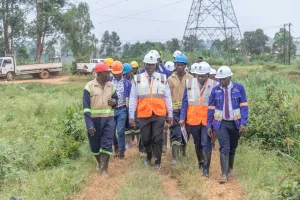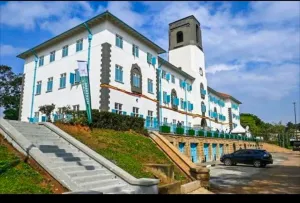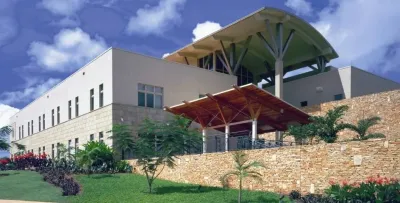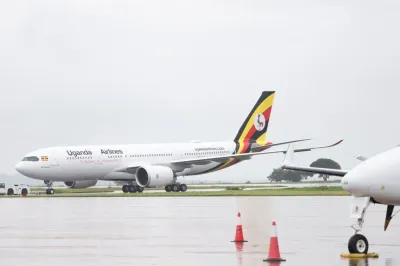
Education
EACOP and Nakawa Vocational Training College Partner to Strengthen Skills in Oil and Energy Sectors
The East African Crude Oil Pipeline (EACOP) project has entered into a partnership with Nakawa Vocational Training College (NVTC) to strengthen practical training in Uganda’s oil, gas, and energy sectors.
This collaboration involves Schneider, a Tier One Contractor for Electrical, Instrumentation, Telecommunication, and Security Systems (EITS). The agreement aims to promote skills transfer, modern training, and capacity building for both students and instructors through exposure to current industry practices.
As one of EACOP’s key contractors, Schneider is tasked with installing systems that oversee and safeguard operations covering areas such as automation, electrical systems, telecommunication, security, and data transmission along the 1,443-kilometre pipeline that connects Hoima in Uganda to Tanga Port in Tanzania.
During the signing ceremony, Natasha Kasami, EACOP’s National Content Capacity Building Lead, emphasized that the initiative forms part of the company’s broader commitment to ensuring Ugandans benefit directly from the oil pipeline through skills development. “As part of our commitment to national content, which is about making sure Ugandans benefit from this project, we have identified strategic institutions with whom we can collaborate,” she said. “Through these partnerships, we want to transfer knowledge, skills, and technology, ensuring that institutions like Nakawa pass on industry-relevant skills that benefit the oil and gas sector and beyond.”
Kasami explained that EACOP serves as a link between international contractors and Ugandan training institutions to ensure technology and expertise are effectively shared. “Many of our contractors or equipment manufacturers may not have a physical presence in Uganda,” she noted. “So EACOP plays the role of connecting them with local institutions to ensure that the knowledge and skills they bring don’t get lost.”
She added that EACOP has already supported over 100 Ugandan students and graduates through internships and training programs. “We know how hard it can be for graduates to get experience when looking for their first job,” Kasami said. “This partnership will give students the chance to turn theory into practice to gain hands-on experience through industrial placements and training from experts who understand what industry really needs.”
The Memorandum of Understanding (MoU) highlights several areas of cooperation namely the training of trainers, student internships, industrial attachments, and equipment support for NVTC’s practical programs.
Through the “Train the Trainer” initiative, NVTC instructors will receive updated technical knowledge to align their teaching with the latest industry standards. Students will participate in internships to acquire hands-on skills, while lecturers will undergo industrial placements to experience real-world work environments. Schneider will also provide training equipment to enhance NVTC’s practical instruction in electrical and instrumentation courses.
Michael Rujumba, the Deputy Principal of NVTC, said the partnership aligns perfectly with Uganda’s Technical and Vocational Education and Training (TVET) policy, which promotes collaboration between educational institutions and the private sector. “We are very excited about this partnership because it’s exactly what the TVET law tells us to do, to partner with industry when implementing the curriculum,” Rujumba said. “The graduates we train are meant to be relevant to the world of work, and partnerships like this one make sure our students are accepted in the industry.”
He noted that the initiative will enhance NVTC’s capacity in electrical disciplines and allow expansion into advanced areas such as instrumentation, control engineering, and programmable logic controls. “We are seeing ourselves improving in the trade of electricity and looking forward to growing into related areas,” he added. “This partnership also allows our students and graduates to go for internships, while our trainers get the chance to return to industry and sharpen their skills.”
The collaboration between EACOP and NVTC complements similar partnerships with other key institutions, including Makerere University, Kyambogo University, Uganda Petroleum Institute Kigumba (UPIK), and the Uganda Industrial Research Institute (UIRI). These initiatives collectively aim to develop a competent local workforce capable of supporting Uganda’s industrial growth well beyond the completion of the pipeline project.
Beyond its physical infrastructure, the EACOP project is significantly investing in human capital. For students, it opens doors to real-world industry experience and better employment prospects. For trainers, it offers opportunities to upgrade their technical knowledge. And for Uganda, it represents a strategic step toward cultivating a skilled workforce that can serve not just the oil and gas industry, but the broader economy as well. “At the end of the day, the goal is that when students graduate from institutions like Nakawa, they can easily fit into different sectors where their skills are needed,” Kasami concluded. “This is about more than building a pipeline; it’s about building people.”













Sunrise reporter
Leave a Comment
Your email address will not be published.